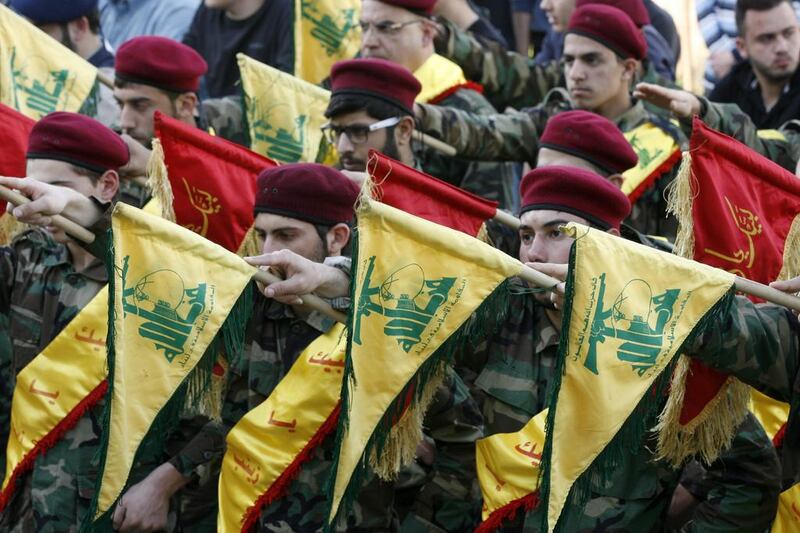BEIRUT // The GCC formally designated Hizbollah as a terrorist organisation on Wednesday as Gulf states continued to build up pressure on the powerful Lebanese group.
The six-nation group accused the Iran-backed Shiite militia and political movement of attempting to recruit Gulf nationals for terrorist acts and said their involvement in regional conflicts threatens the security of Arab nations.
“The GCC states consider Hizbollah militias’ practices in the Council’s states and their terrorist and subversive acts being carried out in Syria, Yemen and Iraq contradict moral and humanitarian values and principles and the international law and pose a threat to Arab national security,” said GCC Secretary General Abdullatif bin Rashid Al Zayani.
He added that Gulf states “will take necessary measures” to enact their decision.
In response, Lebanon’s former prime minister Saad Al Hariri, a Sunni supported by Riyadh, said he would continue an open dialogue with Hizbollah “to avoid sedition” in Lebanon. He said it was not up to him to agree or disagree with the terrorist listing but went on to criticise the group for its involvement in the Syrian war and its alleged involvement in Yemen as “criminal, unlawful and terrorist”.
Hizbollah is already considered a terrorist organisation by a number of countries, including the United States and Israel. Some actors, such as the European Union, only consider the group’s military wing a terrorist group. While the GCC only formally designated Hizbollah as a terrorist organisation on Wednesday, Saudi Arabia, the UAE and Bahrain had previously declared Hizbollah to be a terrorist group independently.
Thousands of Hizbollah militants are fighting in Syria in support of president Bashar Al Assad and the group has also acknowleged a presence in Iraq. Hizbollah has not said it has forces in Yemen, but Gulf states accuse the group of backing Houthi rebels in the country. Last week, Yemen's government released a video allegedly showing Hizbollah members from Lebanon advising Houthi forces.
Gulf states have been building up a case against Hizbollah and putting pressure on the Lebanese government to distance itself from the group.
Late last month, Saudi Arabia cancelled US$4 billion (Dh14.7bn) in security aid to Lebanon saying that Hizbollah had "hijacked" the country. Last week, Saudi Arabia, Qatar, Bahrain and Kuwait told their citizens to leave Lebanon immediately while the UAE put a travel ban on its citizens travelling to Lebanon. Saudi Arabia also blacklisted four companies and three individuals for ties to Hizbollah last week.
Saudi Arabia has demanded that the Lebanese government distance itself from Hizbollah and asked for apologies over the actions of the country’s Hizbollah-allied foreign minister, who refused to endorse official condemnations of attacks on Saudi diplomatic missions in Iran in January.
But with Lebanon’s government divided and wary of taking firm stances on regional conflicts, there has been no clear affirmation that its foreign policy stands in line with Saudi Arabia’s.
The recent moves by Gulf states regarding Hizbollah and Lebanon are part of a larger Saudi-led foreign policy shift in the region. In January, Saudi Arabia cut relations with Iran after mobs attacked two Saudi diplomatic missions in the country following Saudi Arabia's execution of a prominent Shiite cleric who was convicted on terrorism charges. As pro-government forces in Syria made significant gains against rebels this year and peace talks hit stumbling blocks, Gulf states have increasingly been in conversations about a possible anti-ISIL ground intervention in the country.
The GCC’s declaration came hours after after Hizbollah leader Hassan Nasrallah discussed Lebanon’s recent tensions with the Gulf in a televised speech, saying Saudi Arabia was attempting to stir strife in the country.
Mr Nasrallah accused Riyadh of being behind past car bombings in Lebanon and described a speech he gave last year condemning Saudi Arabia’s military involvement in Yemen as “the most honourable thing I have done”.
With the cut in security aid and the travel bans and warnings seen as punishing Lebanon more than Hizbollah, Mr Nasrallah asked why Gulf states were punishing the Lebanese people instead of his group.
“If there is a criminal here, then I am the criminal from your perspective. Why punish the Lebanese people and the army and what moral or legitimate scale permits the Saudis to treat the Lebanese in this offensive way?” he said. “Your problem is with us, it is not with the country or with the Lebanese.”
The formal designation of Hizbollah as a terrorist group by Gulf states was unsurprising. The group was already often referred to as a terrorist organisation by Gulf leaders. Last week, Sheikh Abdullah bin Zayed, UAE Minister of Foreign Affairs, likened Hizbollah and other Iran-backed militias in the Middle East to ISIL and Al Qaeda’s Syria branch Jabhat Al Nusra – two groups that are being targeted by the international community in Syria.
In 2013, GCC member states “unanimously agreed” that Hizbollah was a terrorist organisation, though stopped short of an official designation. At that time, Hizbollah’s role in Syria where it was fighting against Gulf-backed rebels was becoming increasingly felt on the battlefield. While the GCC did not blacklist the group then, they did impose sanctions on them.
jwood@thenational.ae





